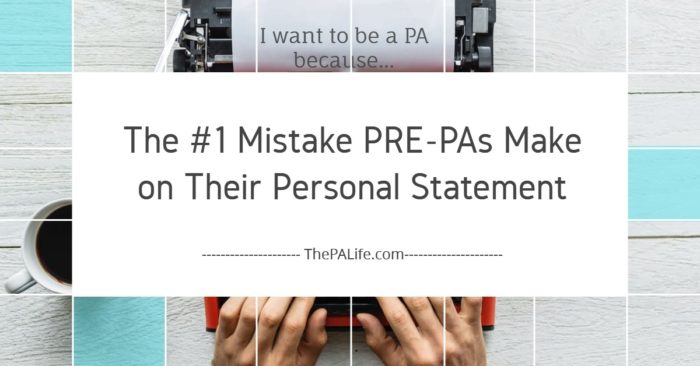
What's the #1 mistake that potential PAs and pre-physician assistant students make while drafting their PA school personal statement?
A failure to outline and plan!
Outlining your personal statement is like following a proven recipe.
Although strong personal statements do not all follow the same format (nor should they), there is a certain formula for success that will showcase your qualifications while highlighting your passion for becoming a PA.
And that's why we have created this time-tested personal statement starter kit to help you outline and write your compelling first draft.
Download Your Ultimate PA School Personal Statement Starter Kit
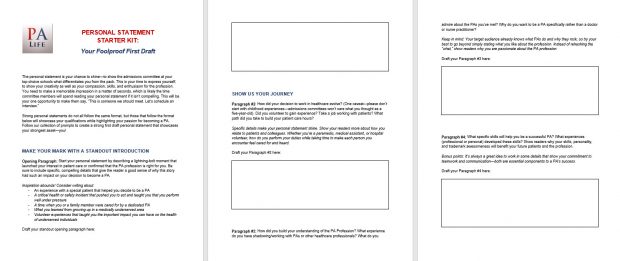
This starter kit takes you step by step through the process of outlining and writing your personal statement. Just follow our collection of prompts, write your paragraphs in the spaces provided, and at the end, you will have a strong first draft personal statement that highlights your strongest asset—you!
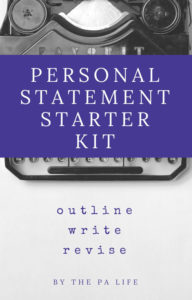
GET YOUR STARTER KIT
You know what, this is so important, I'm not even going to ask you for your email address to get it, I'm just going to give it to you right now, and all you must do is click the button below to get instant access to it.
STEP 1: MAKE YOUR MARK WITH A STANDOUT INTRODUCTION
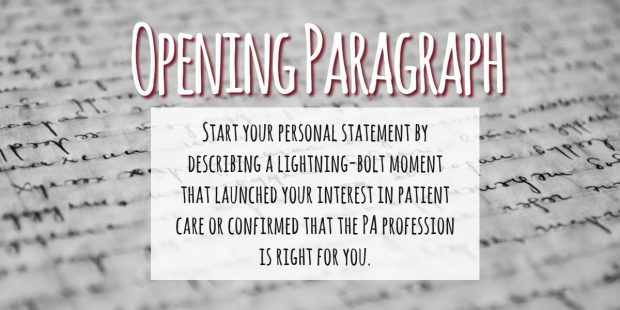
Paragraph #1: Your Opening Paragraph
Start your personal statement by describing a lightning-bolt moment that launched your interest in patient care or confirmed that the PA profession is right for you.
Be sure to include specific, compelling details that give the reader a good sense of why this story had such an impact on your decision to become a PA.
Inspiration abounds! Consider writing about:
- An experience with a special patient that helped you decide to be a PA
- A critical health or safety incident that pushed you to act and taught you that you perform well under pressure
- A time when you or a family member were cared for by a dedicated PA
- What you learned from growing up in a medically underserved area
- Volunteer experiences that taught you the important impact you can have on the health of underserved individuals
Make sure to read:
STEP 2: SHOW US YOUR JOURNEY
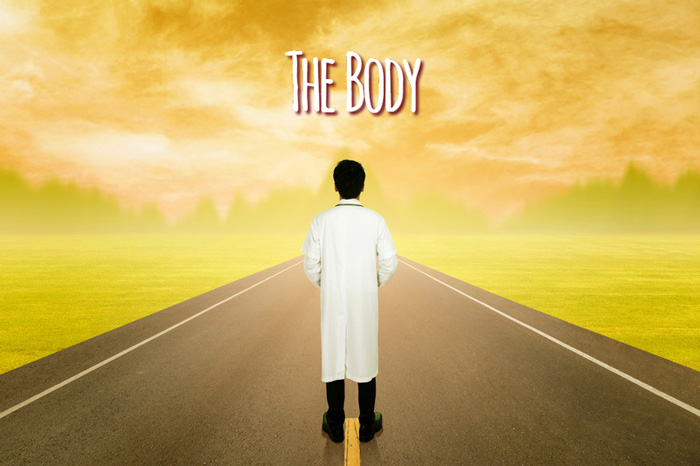
Paragraph #2
How did your decision to work in healthcare evolve? (One caveat—please don’t start with childhood experiences—admissions committees won’t care what you thought as a five-year-old).
- Did you volunteer to gain experience?
- Take a job working with patients?
- What path did you take to build your patient care hours?
Paragraph #3
How did you build your understanding of the PA Profession?
- What experience do you have shadowing/working with PAs or other healthcare professionals?
- What do you admire about the PAs you've met?
- Why do you want to be a PA specifically rather than a doctor or nurse practitioner?
Paragraph #4
What specific skills will help you be a successful PA? What experiences (professional or personal) developed these skills? Show readers why your skills, personality, and trademark awesomeness will benefit your future patients and the profession.
Optional Paragraph #5
Do you have experience volunteering or working with underserved people? Is this a focus that you'd like to have in the future as a PA? How do you show empathy to patients with special needs?
Optional Paragraph #6
Are there any academic issues you need to discuss (grades of C or below, or any withdrawals)? Provide an explanation for any lower grades or academic issues.
Here are: 7 Tips for Addressing Shortcomings in Your PA School Personal Statement

Download Your FREE PA School Personal Statement Starter Kit
STEP 3: CLOSE WITH CONFIDENCE

Your Concluding Paragraph
End your personal statement with a paragraph that connects to your standout opening or overall theme and reiterates why you will be a great PA.
In our book, How to Write Your Physician Assistant Personal Statement, I talk about how the conclusion of your essay is like the last kiss at the end of a first date. It should always leave the recipient wanting more. Here is a good example:
Step 4: Putting it all Together
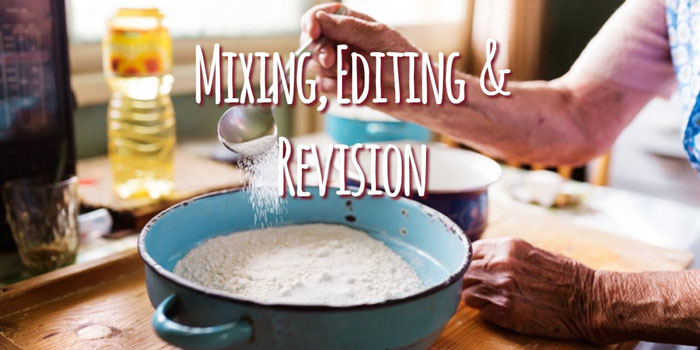
Outlining your essay really is is like following a proven recipe.
Before outlining, you brainstorm or mind map to consider what can be included in your essay. You associate freely, considering related ideas.
Outlining means bringing structure to your scribbles. You decide which ideas you’ll cover, and which you’ll leave out. And you define a logical flow.
Then, like the ingredients in your Grandma's homemade chocolate chip cookies you pull it all together.
If you have downloaded your starter kit and followed the prompts you should have a cookie that's ready for the taste test. The final step is to test it on some beta readers whose opinions you trust.
Let us do the work for you!
Step 1: Download your copy of the personal statement starter kit and fill it out.
Step 2: Send us your completed starter kit and your rough draft essay for completion.
- Receive your free digital copy of our books "How to Write Your PA Personal Statement" and "101 PA School Admission Essays" just for signing up!
- Within 48 hours you will receive your edited and revised personal statement that's on point, personable, polished, within the character limit, and 100% written by you!
Click the buttons and complete the steps:
| Step 1: | Then | Step 2: |
| Download & Complete YOUR STARTER KIT |  | Send us your essay for revision |
View all posts in this series
- How to Write the Perfect Physician Assistant School Application Essay
- The Physician Assistant Essay and Personal Statement Collaborative
- Do You Recognize These 7 Common Mistakes in Your Personal Statement?
- 7 Essays in 7 Days: PA Personal Statement Workshop: Essay 1, “A PA Changed My Life”
- PA Personal Statement Workshop: Essay 2, “I Want to Move Towards the Forefront of Patient Care”
- PA Personal Statement Workshop: Essay 3, “She Smiled, Said “Gracias!” and Gave me a Big Hug”
- PA Personal Statement Workshop: Essay 4, “I Have Gained so Much Experience by Working With Patients”
- PA Personal Statement Workshop: Essay 5, “Then Reach, my Son, and Lift Your People up With You”
- PA Personal Statement Workshop: Essay 6, “That First Day in Surgery was the First Day of the Rest of my Life”
- PA Personal Statement Workshop: Essay 7, “I Want to Take People From Dying to Living, I Want to Get Them Down From the Cliff.”
- Physician Assistant Personal Statement Workshop: “To say I was an accident-prone child is an understatement”
- 9 Simple Steps to Avoid Silly Spelling and Grammar Goofs in Your PA School Personel Statement
- 5 Tips to Get you Started on Your Personal Essay (and why you should do it now)
- How to Write Your Physician Assistant Personal Statement The Book!
- How to Write “Physician Assistant” The Definitive PA Grammar Guide
- 101 PA School Admissions Essays: The Book!
- 5 Things I’ve Learned Going Into My Fourth Physician Assistant Application Cycle
- 7 Tips for Addressing Shortcomings in Your PA School Personal Statement
- The #1 Mistake PRE-PAs Make on Their Personal Statement
- The Ultimate PA School Personal Statement Starter Kit
- The Ultimate Guide to CASPA Character and Space Limits
- 10 Questions Every PA School Personal Statement Must Answer
- 5 PA School Essays That Got These Pre-PAs Accepted Into PA School
- 7 Questions to Ask Yourself While Writing Your PA School Personal Statement
- 101 PA School Applicants Answer: What’s Your Greatest Strength?
- 12 Secrets to Writing an Irresistible PA School Personal Statement
- 7 Rules You Must Follow While Writing Your PA School Essay
- You Have 625 Words and 2.5 Minutes to Get Into PA School: Use Them Wisely
- What’s Your #1 Personal Statement Struggle?
- 31 (NEW) CASPA PA School Personal Statement Examples
- How to Prepare for Your PA School Interview Day Essay
- Should You Write Physician Associate or Physician Assistant on Your PA School Essay?
- Meet the World’s Sexiest PA School Applicants
- PA School Reapplicants: How to Rewrite Your PA School Essay for Guaranteed Success
- How to Write a Personal Statement Intro that Readers Want to Read
- PA School Reapplicant Personal Statement Checklist
- How to Deal with Bad News in Your Personal Statement
- Inside Out: How to use Pixar’s Rules of Storytelling to Improve your PA Personal Statement
- Ratatouille: A Pixar Recipe for PA School Personal Statement Success
- Personal Statement Panel Review (Replay)
- Mind Mapping: A Tool for Personal Statements, Supplemental Essays, and Interviews
- Start at the End: Advice for your PA School Personal Statement

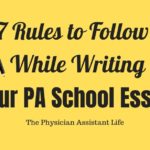













Hi! I would love some feedback on my personal statement below! I know it is over the character count but before I start eliminating, some feedback would be amazing!!!
Thank you!!
Walking through the doors of the Emergency Department into triage I raced to find a familiar face in a waiting room. “Marina” I heard as I sped down the hallway. I stopped and backed up to find my mother sitting up in her general triage room. I had never been to a hospital to visit my own family. I took a seat at the edge of the bed and looked at her. “What’s going on? How are you feeling?” She shrugged and looked around. “Dad told me you are having a tough time remembering things,” I said with a soft voice and teary eyes. All I could think of were questions from mini-mentals I had performed with my Alzheimer’s and dementia residents as a CNA. “Mom, what is your last name?” She looked up at me, nervously half smiled, and answered “Rose” with a breath. “Ok, yes same as mine, do you know where you are?” She looked around and back at me, “in a hospital.” Good, I thought, but unable to tell me which one. “Do you know what time it is? Can you read this clock for me?” I asked as I pointed. Her eyes bounced up and down between me and the round grade school clock that hung above the door. I waited, and urged her with tears rolling down my cheeks, “Mom, can you tell me what time it is?” She looked at me with a blank face, unable to tell the time. She was hardly bothered by this incapacity. Minutes after our interaction she seized into a coma that lasted 25 days.
I first learned of physician assistants when I miscalled my PA, Maureen, a doctor during an annual checkup at my pediatrician’s office. I had been seeing Maureen for as long as I could remember. She was always kind, attentive, impartial, sharp, and perceptive which made her perfect for working with young populations, and she absolutely loved her job. Many times, while my mother was in the ICU, I thought about Maureen. She knew me, she took notice of my interests, and her care and approach were tailored specifically to me. It was obvious every patient who came to see her received this level of care. Years later, these encouraging bits of Maureen served as stark contrasts to the hospital waiting room where I sat while my mother’s critical condition failed to improve. Days into this reality a PA, Huma, from a team in the hospital came to introduce herself. Huma was a new PA. She confidently reassured us that the Neuro ICU would give my mother the best care possible. She explained that the ICU’s low patient-to-nurse ratio was perfect for her condition. Her attentiveness, knowledge, and delicate but strong manner were encouraging. Huma did not shy away from the severity and possibility of my mother’s condition worsening but confirmed that the ICU was the best possible place to monitor her. I felt heard. I felt informed. I felt lighter. For me, Maureen and Huma exemplify how genuine care builds crucial trust between a provider and patient which inspired me to pursue being a PA.
I became a CNA after graduating from college. The patient care you provide as a nursing assistant attracted me as a hands-on learner. Prior to becoming a CNA, I worked as a Home Health Aide but with limited training offered and no growth opportunities, it proved to be too static. I was unsatisfied with the range of care I could provide and decided becoming a CNA would afford me more autonomy and responsibility. This was true to an extent. Again, I found myself wanting to be more involved and challenged, medically. My role as a CNA became monotonous, my shifts often lacked balanced, cohesive teamwork, and even when practicing to my license’s full capacity it did not permit me to partake in the care decisions that produce real positive patient outcomes. I recognized to have more of an impact on patients, continuing my academic career was essential and entrance into PA program would broaden my scope of practice drastically. My position as a CNA was a stepping stone in my growth which ultimately solidified my PA career choice.
As a life lifelong competitive athlete, I recognized the importance of teamwork at an early age, but I really learned of its value while struggling to find my purpose as an undergraduate. I was overwhelmed, behind on credits, and found it difficult to confidently choose a career path. As I looked to transfer universities, an upperclassman teammate encouraged me to give Providence “one more semester.” Trusting her advice, I finished the year. The next semester, I stumbled upon Health Policy where I found an intriguing course curriculum and an excellent academic support system. However, I was not set on leaving behind my passion for the sciences and so in addition to my major requirements I took science prerequisites, too. My undergraduate GPA reflects my hesitant path of uncertainty and the sacrificed hours of being a division-1 student-athlete. But my overall science prerequisite GPA highlights my growth and determination to achieve my goal of earning a spot in a PA program. I hope that my recent post-graduate work in the most difficult core sciences will help Admissions discount my less than stellar undergraduate GPA. I know that the thousands of hours of hands-on patient care I have accumulated make a strong case for my potential as a PA. Being a team member, a support system, an effective communicator, and a liaison for others so clearly gives me purpose. I have put in the hard hours to be afforded this chance and believe I deserve the chance to fulfill my goal of becoming a PA. After months in the hospital standing by my mother to my years as a dedicated CNA, I have finally found the healthcare career that fulfills my purpose.
The summer before my freshman year of college, I was speaking with a family friend about my career aspirations and explaining how I would be completing my undergraduate degree in Athletic Training. I followed this by detailing my desire to further my education in the medical field. As I was discussing my interest in pursuing medical school, Mary, a healthcare professional herself, could sense the uncertainty in my voice and ultimately, in my plans. At this point in time she proceeded to ask me about my interest in becoming a physician assistant, a profession of which I was minimally aware of at the time. After our conversation and some additional research of my own, with no doubt in my mind, I knew that I wanted to spend my next three years of college preparing myself to become a physician assistant. The career of a PA had everything that the career of a physician was missing for my own life goals and desires. As a PA I would have the opportunity to switch specialties, spend more time with my patients and less time with my paperwork in many settings, and I could play an integral part of a team in providing care a patient wants, not just the care they need.
My first year of college came with many different opportunities, one of which was volunteering at the local hospital and interacting with patients in both the emergency and oncology departments. Caring for patients in these settings led me to completing the EMT program in the spring semester in addition to my degree curriculum. As I continued to learn about more ways in which I could provide care to others, I was continually drawn to my education and devoting myself to being the best clinician I could be for those who needed someone the most. In March of that Spring semester I met Kevin. Kevin was barely fourteen when he was forced to stand by and watch while his mother was killed in an act of gang violence. In speaking with Kevin during my time in El Salvador, he told me he was going to become a doctor so that his community could have the care his mom didn’t receive in her dire need. Kevin explained his goals to me with no quiver of doubt in what he was about to do, regardless of the fact that he was only just given the opportunity to attend high school. His words and passion resonated with my own goals. No complete education can be based solely on classroom lectures and homework assignments, but rather life experiences and failures that can push you to be the best version of yourself amongst your learning.
Athletic training helped to further my passion for medicine and an internship with J Robinson Intensive Wrestling Camps leading into my third and final year of my undergraduate degree affirmed my desire to extend my scope of practice within medicine. On one particular occasion, I stabilized and transported a wrestler with a radius/ulna compound fracture in assistance with EMS while monitoring vital signs. At the ED, my athlete was first seen by a PA who conducted his plan of care in preparation for transportation and a surgical ORIF the following morning. This was one of my many encounters with PAs over the summer. In my clinical experience I’ve been able to diagnose, manage and treat a variety of dermatologic, orthopedic and medical related conditions in athletes ranging from the ages of 12 to 22.
More recently I had the opportunity to be a Nordic ski instructor for the National Disabled Veterans Winter Sports Clinic in Snowmass, Colorado. During this week-long clinic, I assisted many different veterans, all suffering from varying injuries and was able to offer them a smile and the ability to do something they hadn’t even thought was possible because of their current condition. Due to the numerous different adaptive sports at this clinic, Nordic skiing didn’t frequent new vets, but rather welcomed familiar faces from years past. This year was different, many vets swarmed to the Nordic venue to push themselves physically in ways they hadn’t before. Nordic ski instructors tend to say that we earn every downhill because of the work it takes to get up, and that is the thrill of the sport. One of the veterans I worked with, Bob, had a different view, he couldn’t wait for the uphill battles, “I haven’t felt this able-bodied in years,” a statement that made me tear up. Bob was a testament to hard work and dedication who kept coming back over the course of that week and after race day, he told me something in his goodbye that I will never forget. “Megan, I can’t thank you enough for what you have done for me this week, if you care for your patients the way you have cared for me, you will have blessed many lives.” In this moment, all of the sleepless nights studying and countless hours caring for others were made worthwhile. This is a feeling that I didn’t want to end there and one that I have no intention of letting escape, because I hope that all of my future patients I treat as a PA will feel the same way.